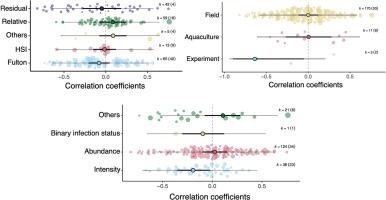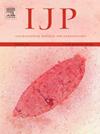寄生虫感染对鱼体状况的影响:一项系统综述和荟萃分析。
IF 3.2
2区 医学
Q1 PARASITOLOGY
引用次数: 0
摘要
基于宿主体重和体长关系的宿主体质指数(bci)是评估寄生虫对宿主健康负面影响的常用方法。尽管许多研究人员,特别是鱼类生物学家和渔业管理人员,通常使用脑接口,但脑接口与感染关系的总体一般模式尚不清楚。在这里,我们首先系统地回顾了216篇出版物中的985种鱼类BCI -感染关系,并研究了影响BCI -感染关系的强度和方向性的因素。我们特别预测了使用的BCI测量、寄生虫分类类群和使用的感染测量会影响观察到的BCI -感染关系的效应大小和方向性。我们发现,大多数研究都严重偏向于特定的脑机接口测量,如富尔顿脑机接口和相对脑机接口。此外,与使用其他脑机接口方法的研究相比,使用Fulton's脑机接口的研究更有可能报告显著的结果,这表明指数的选择可能导致对寄生虫负面影响的高估。我们的荟萃回归发现,使用寄生虫强度作为感染测量和基于实验而不是自然感染的研究更有可能报告显着的负面影响,但寄生虫分类组之间没有差异。令人惊讶的是,许多研究,特别是实地研究,并没有报告脑机接口与感染之间的显著负相关,这与研究人员普遍认为寄生虫会对鱼类健康产生负面影响的预期相反。我们讨论了这些结果背后的潜在机制。最后,我们对BCI -感染关系在未来研究中的应用提出了几点建议。本文章由计算机程序翻译,如有差异,请以英文原文为准。

Effect of parasite infections on fish body condition: a systematic review and meta-analysis
Using host body condition indices (BCIs) based on the relationship between host body mass and length is a general and pervasive approach to assess the negative effects of parasites on host health. Although many researchers, especially fish biologists and fisheries managers, commonly utilize BCIs, the overall general patterns among BCI – infection relationships remain unclear. Here, we first systematically reviewed 985 fish BCI – infection relationships from 216 publications and investigated the factors affecting the strength and directionality of effects in BCI – infection relationships. We specifically predicted that the BCI measure used, parasite taxonomic group, and the infection measure used would influence the observed effect size and directionality of BCI – infection relationships. We found that most studies were heavily biased towards specific BCI measures such as Fulton’s BCI and Relative BCI. Furthermore, studies using Fulton’s BCI were more likely to report significant results compared with those using other BCI measures, suggesting that index choice could lead to an overestimation of the negative effects of parasites. Our meta-regressions uncovered that the use of parasite intensity as an infection measure and studies based on experimental rather than natural infections were more likely to report significant negative effects, however there were no differences among parasite taxonomic groups. Surprisingly, many studies, especially field studies, did not report significant negative correlations between BCI and infection, contrary to widespread expectations among researchers that parasites would negatively affect fish health. We discuss potential mechanisms underlying these results. Finally, we make several recommendations for the use of BCI – infection relationships in future studies.
求助全文
通过发布文献求助,成功后即可免费获取论文全文。
去求助
来源期刊
CiteScore
8.40
自引率
2.50%
发文量
76
审稿时长
23 days
期刊介绍:
International Journal for Parasitology offers authors the option to sponsor nonsubscriber access to their articles on Elsevier electronic publishing platforms. For more information please view our Sponsored Articles page. The International Journal for Parasitology publishes the results of original research in all aspects of basic and applied parasitology, including all the fields covered by its Specialist Editors, and ranging from parasites and host-parasite relationships of intrinsic biological interest to those of social and economic importance in human and veterinary medicine and agriculture.

 求助内容:
求助内容: 应助结果提醒方式:
应助结果提醒方式:


